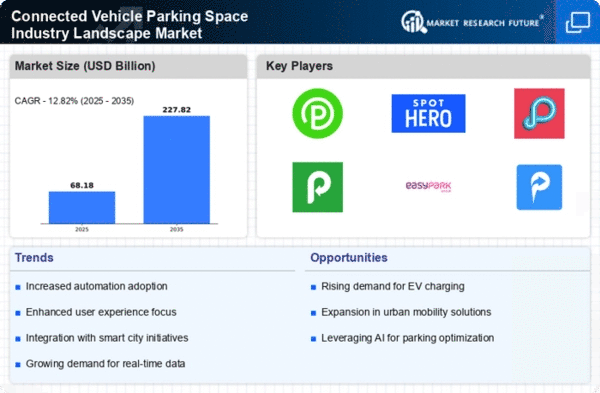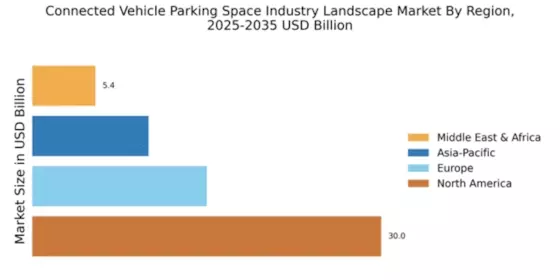Market Growth Projections
The Global Connected Vehicle and Parking Space Industry Landscape Market is projected to experience substantial growth over the coming years. With a market value of 60.4 USD Billion in 2024, it is anticipated to expand to 227.8 USD Billion by 2035. This growth trajectory suggests a compound annual growth rate (CAGR) of 12.82% from 2025 to 2035. Such projections indicate a robust demand for connected vehicle technologies and innovative parking solutions, driven by factors such as urbanization, technological advancements, and changing consumer preferences. The market's expansion reflects the increasing integration of connectivity in the automotive sector.
Technological Advancements
The Global Connected Vehicle and Parking Space Industry Landscape Market is experiencing rapid growth due to advancements in technology. Innovations such as vehicle-to-everything (V2X) communication, artificial intelligence, and the Internet of Things (IoT) are enhancing vehicle connectivity and parking solutions. For instance, smart parking systems that utilize real-time data to guide drivers to available spaces are becoming increasingly prevalent. This technological evolution is projected to contribute significantly to the market, which is expected to reach 60.4 USD Billion in 2024 and grow to 227.8 USD Billion by 2035, indicating a robust CAGR of 12.82% from 2025 to 2035.
Consumer Demand for Convenience
Consumer demand for convenience is a significant driver of the Global Connected Vehicle and Parking Space Industry Landscape Market. Modern consumers increasingly seek seamless experiences, particularly in urban environments where parking can be a challenge. Connected vehicle technologies that offer features such as remote parking, reservation systems, and real-time availability updates cater to this demand. As consumers prioritize time-saving solutions, the market is likely to witness an uptick in the adoption of smart parking applications and connected vehicle features. This trend reflects a broader shift towards convenience-driven services in the transportation sector.
Urbanization and Population Growth
Urbanization and population growth are pivotal drivers of the Global Connected Vehicle and Parking Space Industry Landscape Market. As cities expand and populations increase, the demand for efficient transportation and parking solutions intensifies. The rise in vehicle ownership, particularly in developing regions, necessitates innovative parking strategies to alleviate congestion. This trend is underscored by the increasing number of vehicles on the road, which is projected to rise significantly in urban areas. Consequently, the market is poised for substantial growth, reflecting the urgent need for smart parking solutions that can accommodate the evolving urban landscape.
Government Initiatives and Regulations
Government initiatives and regulations play a crucial role in shaping the Global Connected Vehicle and Parking Space Industry Landscape Market. Many governments are actively promoting smart transportation solutions to enhance urban mobility and reduce environmental impact. Policies that incentivize the adoption of connected vehicles and smart parking technologies are becoming more common. For example, various countries are implementing regulations that require the integration of advanced safety features in vehicles, which indirectly boosts the demand for connected vehicle technologies. Such initiatives are likely to drive market growth as stakeholders align with regulatory frameworks aimed at fostering sustainable transportation.
Environmental Concerns and Sustainability
Environmental concerns and the push for sustainability are increasingly influencing the Global Connected Vehicle and Parking Space Industry Landscape Market. As awareness of climate change and pollution rises, there is a growing emphasis on reducing carbon emissions from vehicles. Connected vehicle technologies facilitate more efficient driving patterns and optimized parking solutions, contributing to lower emissions. Moreover, the integration of electric vehicles into the connected ecosystem further enhances sustainability efforts. This shift towards greener transportation options is expected to propel market growth as consumers and businesses prioritize environmentally friendly solutions.

















